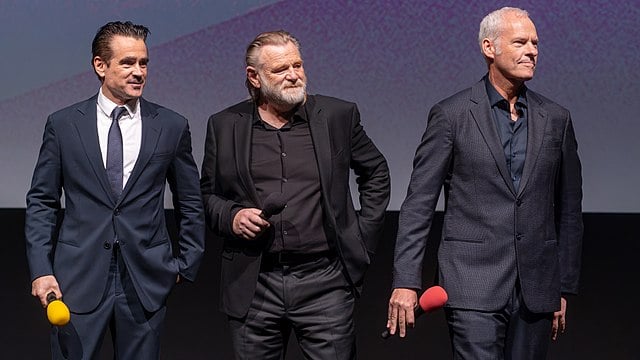Bookshelves are the most revealing part of a room. It’s there you’ll discover if your potential hook up is into incel-adjacent self-help books (in which case, leave as soon as possible) or bruised editions of old paperback classics (in which case, they’re a keeper). An Oxford undergraduate’s bookshelf, however, is more likely to be filled with an unchanging set of volumes, brought ritualistically to Uni at the beginning of each term as part of an optimistic belief in the existence of free time. In a city with such a rich cultural history, you can absolve yourself of the nagging guilt over these books left to gather dust by absorbing the inspiration its alleys and canals have to offer. Below is the perfect afternoon dawdle, chasing the ghosts of literary greats through the town – particularly beautiful right now as the leaves start to turn.
First stop – Christ Church College and the Thames
The richest, biggest, and most pretentious of Oxford’s Colleges, it is also the site on which Mathematics don Charles Lutwidge Dodgson (better known as Lewis Carroll) found inspiration for Alice in Wonderland. A boat trip from Folly Bridge to Godstow undertaken by Carroll and the three daughters of a dean from the college on the 4th July 1862 was later identified by the author as the date of inspiration for his nonsense novel. Its protagonist is supposedly based off of the middle daughter, Alice Liddell, with whom Caroll enjoyed a particularly close relationship – it’s been speculated by a biographer of Liddell’s that his sudden break from the family occurred after his desire to wed the 11-year-old girl was discovered.
(Hint: This connection to Alice in Wonderland is why you’ll find Alice’s Shop opposite the college.)
Up High Street to University College
Percy Shelley’s name does not usually figure on the list of Oxford’s literary alumna. Possibly because his stay at the university was so short. He was expelled five months after arriving at University College in 1810 for circulating a pamphlet called ‘The Necessity of Atheism’ that he and fellow student Thomas Jefferson Hogg had written.
Down Magpie Lane to Merton College
Don’t ignore Magpie Lane as you pass through – Robin Swift, main character of R F Kuang’s dazzling 2022 ‘Babel’, spends a brief few months of semi-blissful ignorance at the beginning of the novel living here in student accommodation. Kuang’s study of academic complicity in imperialism could not be further from the homely nostalgia of ‘The Hobbit’, written by future fellow of Merton College J.R.R.Tolkien. Merton, mischievously re-imagined as ‘Judas College’, plays a crucial role in Max Beerbohm’s Zuleika Dobson. It is Zuleika’s familial connection to the university that allows her to gain access to and wreak havoc upon the sexually frustrated men within Edwardian Oxford.
Up Merton Street to Magdalen College and Holywell Cemetery
Magdalen College dons were taken by surprise in 1878 when Oscar Wilde, notorious University-wide for his aestheticism and disobedience, graduated with a double first in Classics. Some fifty years later, The Inklings – a group of writers including C. S. Lewis and J. R.R. Tolkien – began their regular meetings at Lewis’ fellow’s room in the college. Behind the college lies Holywell Cemetery, which not only contains the grave of Theophilus Carter, reputed inspiration behind the Mad Hatter, but also Kenneth Grahame, who wrote ‘The Wind in the Willows’, and the son for whom it was written.
Down Holywell Street to the Bodleian and Rad Cam
Grahame bequeathed all his royalties to the Bodleian despite never studying at the University; this imaginative hold of the library’s over generations of writers is testified to also by the central place it occupies in Babel and Deborah Harkness’ All Souls trilogy. In the former, Kuang constructs a towering new linguistics building in the midst of its courtyard, whereas in the latter the witch Diana Bishop discovers an arcane text that inducts her into a community of magic-casters and vampires. Walking past the Rad Cam, you’ll come to the approximate location of Jordan College, a parallel universe equivalent of Exeter College, where Philip Pullman was an undergraduate and decided to use as his main character Lyra’s Oxford base in the His Dark Materials trilogy, a subversion of Milton’s Paradise Lost.
Up Catte Street to Hertford College
Hertford boasts not only the Bridge of Sighs, but also the distinction of having Evelyn Waugh as an alumna. His satirical Decline and Fall comments on elite circles of interwar Britain.It begins with the expulsion of main character Paul Pennyfeather after getting caught up in the actions of the Bollinger Club (a very thinly veiled fictitious Bullingdon Club), whereas Brideshead Revisited is a work of nostalgia for easy hierarchy.
Down Broad Street to St John’s College
Philip Larkin, arguably the most sour poet of the 20th century, spent much of his time as an undergraduate at St John’s College writing lesbian stories under the pseudonym Brunette Coleman. One of these, entitled ‘Michaelmas Term at St Bride’s’, is set in a women’s college with striking similarities to Somerville, which segues us away from Larkin’s sexual frustrations to the next stop.
Up St Giles’ Road to Somerville College and Jericho
The Eagle and Child, once a famous Inklings’ haunt, now stands lifeless on this road, despite having been bought by the American Ellison Institute of Technology last year. Somerville itself is a much happier sight. It’s been home to A.S. Byatt, whose beautiful Possession explores academia, forbidden Victorian affairs, and Brittonic poetry; Dorothy L Sayers, a writer of feminist mysteries who set her Gaudy Night at an alumni dinner at a certain ‘Shrewsbury College’; and others including Iris Murdoch, Frances Hardinge, and Vera Brittain, whose semi-autobiographical Testament of Youth begins with her preparations to study at Somerville being abandoned by the advent of the First World War.
Optional last stop – Woodstock and the greater Oxford area
The first of Colin Dexter’s thirteen Inspector Morse novels begins with a group of women waiting for a bus to Woodstock, which now runs from Keble Road just outside Somerville’s main entrance. As – and if – you take the bus out of Summertown to this quiet village belonging to Blenheim Palace, you could end this literary ramble on a depressing note by reflecting on the bleakest story to find inspiration from Oxford’s dreaming spires. Thomas Hardy’s Jude the Obscure tracks the eponymous character’s desire to attend ‘Christminster’ as a scholar. This is made impossible by the sexual and class standards of late Victorianism. Hardy himself was never able to progress his education past the age of 16, and Jude never manages to gain access to the colleges he longs to be a part of. The full story is so unrelentingly comfortless that it’s thought to be the reason Hardy gave up writing novels, and tried his hand at poetry instead.
One of the most surreal aspects about life in Oxford is the opportunity to walk the same roads as the figures you study, and those revered and studied before them. But the various imaginations that have found their outlet in the city enable you also to discover the paths of those figures who exist ordinarily only on the page. It’s a privilege that should not be neglected – we hope you’ll embrace it instead, on wanders such as this.











